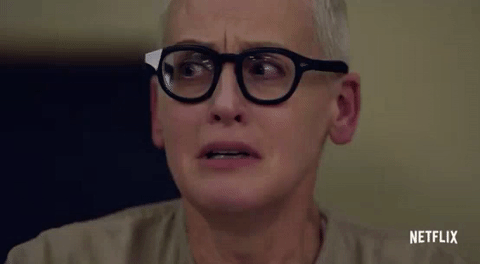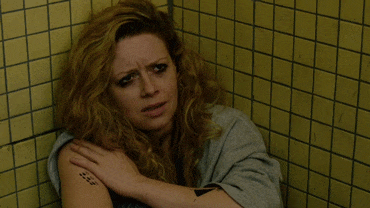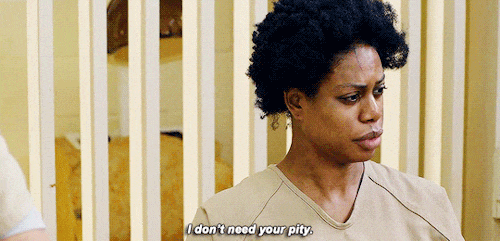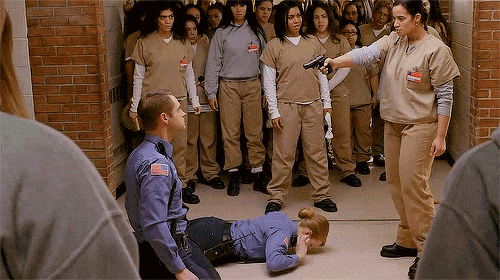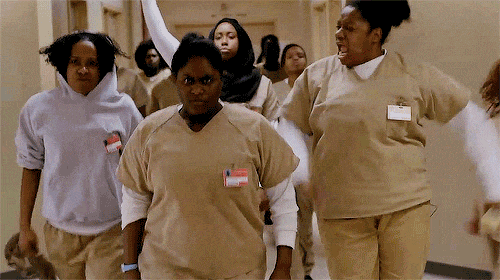The hit Netflix television show "Orange is the New Black" began as an adaptation of Piper Kerman's memoir of her time spent in an all women's prison, but as the show gained traction and ran out of nonfiction material to pull from, it grew into a powerful and dark series that made bold political statements and gave viewers a look into the variety of lives living behind bars. Season one focused around Piper and her relationships with her fellow inmates, but over the course of four years, has become less and less about the well-to-do white woman who believed that she didn't deserve to be in prison and has expanded its cast of characters. OITNB has been praised for creating roles for actresses who might be seen by mainstream Hollywood casting directors as "too gay, too black or too Latina," and the focus on crafting characters that represent true diversity makes the show even more riveting.
Seasons one through three shed light on several political issues, such as the stigmas surrounding lesbians and bisexuals, drug addiction, police misuse of power and inhumane conditions in American prisons. And while we, the audience, got a taste of what being in these characters' shoes might be like, most of us were still watching from a far-removed place, not having had experiences anywhere close to those of the people we were watching. Season four changed all that.
Warning: Season four spoilers ahead!
Season four came out of the gates holding nothing back. It picked right back up where the cliffhanging finale of the previous season had left off, but with a much different tone. We had last seen the majority of the inmates enjoying a rare moment of bliss in the lake without thought of consequence, but the instant we get back to them, the mood has changed and consequence and discipline are most definitely on the table, a running theme for the season.
In regards to Alex Vause's life or death situation, the inclusion of her name in the season four cast list told us that she wasn't done for just yet, but instilled in us a sense of dread, knowing that she was going to have to go to extremes to keep herself alive. And what happened was even more extreme than we could have imagined. In the end, the only way to save her own life was to take another's, and we watched Alex, a character we had grown to love because of her humanity, slowly suffocate a man to death.
As was the groundbreaking camera shot of Tiffany "Pennsatucky" Doggett's rape in season three, we were not giving the privilege of getting to look away during the suffering, a directing choice that struck us to the core. We could see the pain in Alex's face and feel her despairing where her life had led her. She was never a violent person and had a set of morals that was battered but intact; this scene spoke volumes to the lengths prisoners have to go just to survive, and that even a remorseful and reformed criminal isn't protected by the flawed incarceration system.
Another common theme regarding the complexity and complete lack of black and white situations in life came with Pennsatucky's relationship with the guard who raped her. After it happened in season three and for the first half of season four, she's scared and hurt, avoiding the perpetrator at all costs and seeking comfort in a friendship with Carrie "Big Boo" Black. But after she has a conversation with her rapist and realizes that he isn't even aware of what he did, her feelings for him begin to creep back into the picture, much to the dismay and disgust of Big Boo.
Pennsatucky even goes as far as to kiss the guard in a one-on-one interaction of theirs, which left audiences very confused about what they were supposed to feeling, as was the point. As easy as it would be to be furious with a man who committed such a terrible act, life and relationships are often much more complicated than that, and cut and dry emotions usually function. We're left at least with the comfort of knowing that it's not likely to happen again because the guard is human and has expressed remorse, but we don't know how to feel about his victim forgiving him.
Season four also dedicated a lot of screen time to revealing the realities of living with mental illness and the various ways it can effect people. The character most obviously afflicted with a mental condition was Lolly Whitehill. Earlier seasons showed us she suffered from some form of extreme paranoia that made her fear the government and conspiracies, but season four gave us a look into her backstory and a better understanding of where that fear originated.
Lolly had been suffering from her illness all her life, a family friend having sought to institutionalize her as a young adult. Like so many others, she received no help, resources or advice on coping with the panicking voices inside her head. Circumstances forced her to figure out on her own how to survive each day, and while she managed for several years, she lived on the streets, her only income coming from selling coffee to other homeless people. When she arrived at Litchfield, she almost murdered another inmate because the voices in her head told her to, and if it had not been a non-violent offender like Alex, Lolly could have died.
Also, because of her condition, almost no one believes anything Lolly says, and even counselor Sam Healy, who manages to construct his first positive relationship with an inmate in her after four seasons, doesn't believe it when she tells him that she killed the missing guard. Our hearts broke when she was found in her homemade "time machine" and saying she was "trying to travel back in time, back before I killed that guy," and our hearts crumbled to pieces when we had to watch her being taken to the infamous and inhumane psych ward as Healy stood at the gate and watched.
On the matter of Sam Healy, a misogynist, racist and homophobic man who is notoriously bad at his job of counseling women, we finally saw a turnaround this season. Viewers had received a glimpse of his backstory and knew that his mother suffered from a disease similar to Lolly's, but that information on its own didn't feel like a justification for all of his negative treatment of the prisoners. Season four finally illuminated the deep seated guilt Healy had regarding his ill mother and how he blamed himself for her demise and eventual disappearance. Desperate to change a life for the better in order to make peace with his past wrongdoing, he'd say anything and be anyone in an attempt to win someone over; the problem was that he never said or did the right thing.
His understanding of Lolly's condition came because it struck close to home and showed a humane side of him not before seen. When he lost her as well, it almost caused him to take his own life, and we hurt for Healy in a way that we didn't think we ever would. When he made the decision to check himself into a mental hospital, we nodded our heads in support and were grateful to see that at least one person was going to get help and be okay. But even still, it also displayed the privilege that a free man had to take his life into his own hands and ask for assistance, a luxury that prisoners and many others do not.
While drug addiction has been attributed to quite a few characters (about half of the ones we know well are incarcerated for drugs in some form), the complexity of addiction was examined even further in this season. We'd seen Nicky Nichols' backstory and knew that drugs have been a prevalent part of her life for years, watched her struggle to get clean upon her arrival to Litchfield with the help of Red, sat on edge with our fingers crossed in season two as she was tempted by the stash of contraband heroin and cried in season three when she was sent to maximum security after being ratted out by a guard who she was working with. We were delighted to see her rejoin the bunch midway through season four, but morned as we watched her again travel back down the slippery slope of drug usage. Her actions showed viewers who had never had an experience with addiction just how controlling it is; Nicky had people who cared for and supported her and was finally out of maximum security, but still couldn't handle her uncontrollable need for substances. The pain it caused her and those who cared about her was a powerful reminder that addiction is not to be underestimated.
The cruel reality of the effects of solitary confinement and the inhumane treatment of transgender individuals crushed us whenever we got a glimpse into Sophie Burset's condition. Having been sent unfairly to solitary "for her own safety" after having been the victim of several brutal hate crimes, Sophia's will to live despite all she'd fought for diminished at an astonishing rate. Just as the season focused less than before on flashbacks to create the atmosphere of being confined to Litchfield more than ever, the decision to only show bits and pieces of Sophia's suffering conveyed just how alone in her hell she really was. She began going to drastic lengths to be heard, from flooding her cell to setting it on fire, and finally, even as a woman with a dearly beloved family and many passions in life, tried to kill herself. The transformation of Sophia from the show's introduction of her to her suicide attempt was a brutal wakeup call to the reality of prisoner mistreatment and transgender hate in our society.
Season three saw the introduction of untrained and unqualified guards as a result of budget cuts at Litchfield, but season four brought in a whole different class of them; these guards were aggressive, misused their authority, projected their own pride and masculinity issues on the women in their care, and bordered on being downright racist and hateful. Their refusal to acknowledge the lack of adequate hygiene procedures, food supplies, jobs and quality of life reared its ugly head throughout the episodes. The humiliating punishments for small offenses, such as forcing inmates to stand on tables for hours on end or performing pat down "security" checks only on inmates of certain races infuriated us and provided exposure to the fact that these practices happen every day in real life.
Even something as repulsive and absurd as the forcing an inmate to eat a live rodent at gunpoint isn't a reach for what goes on behinds bars that the rest of the country knows very little about. When the inmates riot at the end of the season finale, Dayanara Diaz is the one to pick up a guard's fallen gun and turn it on him, as she is possibly the one who has received the most abuse from a guard; the officer who got her pregnant and promised her a life with him has vanished without a trace, and like many others, she finally reaches a breaking point and loses all ability to make a judgement call when offered a chance at action.
Last, but certainly not least, was the absolutely heartbreaking death of Poussey Washington. The decision to kill off one of the series' most beloved characters to make a bold political statement was a risky yet extremely powerful move. It was a clear reference to the black lives matter movement and is one of the best uses of a show's platform to raise awareness for an issue in many years. In the same way that Angel from "Rent," a character loved by all who doesn't have a mean bone in her body and is looking to future, is the one to die of AIDS, the writers of "OITNB" had to chose a character that viewers had come to love for them to fully experience the anger and devastation of the loss of innocent life.
Poussey had found love, had a job opportunity down the road and was participating in a peaceful protest when her life was taken by a guard. But as it had been shown all season, life is never black and white, and the officer who killed her first hand did not have the intention to cause her any harm at all. He was a young boy with minimal training who was following the orders of a spiteful man, drunk with power and working for an institution that put little value to the lives of inmates. The blame for her death falls much more on the system of violence and the racist nation that both the inmates of Litchfield and the citizens of the United States live in.
Many of us may not have lost a friend or family member to a senseless, race-based killing, and therefore, have never experienced anything near the emotions that come with it; the use of a character we feel like we've come to know personally over four years invokes in us feelings that we've never taken the time to examine before and calls us to action in our own society.
Poussey's death combined the horrors of three notable police killing of black individuals, Eric Garner's pleas of, "I can't breathe," the disrespect of Michael Brown's body and the refusal to say Sandra Bland's name after her death. The heartbreak and anger that viewers felt after losing a fictional character in this way should translate to the realization that this happens in our country everyday and to the passion to get involved in saving lives.
Season four of "Orange is the New Black" made a brilliant use of its popularity to address some of the biggest issues plaguing our nation today. We can't wait for more content to come and can only hope that the lives of our favorite cast of characters will inspire audiences to go out and fight for justice.







